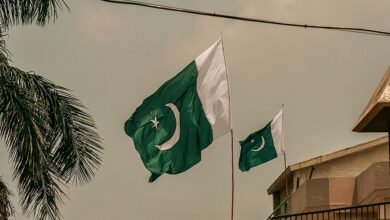I was recently interviewed by an American television channel on the 10th anniversary of the 11 September attacks on the World Trade Center and the Pentagon. “How do Egyptians feel towards the US Administration after the success of their popular revolution?” the presenter said, confidently asking her leading question in expectation of an answer that would please her.
It appears that Americans believe Arab nations feel grateful to the US after the success of their peaceful revolutions, which toppled their despotic leaders whose friendship with the US was no secret. Despotic Arab leaders were often allies of the US, followers or even servants of US policies.
Citing the success of peaceful Arab revolutions in Tunisia and Egypt, some Arab politicians were quick to express their satisfaction with the decline of the discourse of violence.
Peaceful protests may indeed be an appropriate vehicle of change when a nation wants to bring down a despotic regime. However, this method of change may not be fitting when addressing US arrogance, its occupation of Arab and Muslim land and its absolute bias towards Israel at the expense of legitimate Arab rights.
Popular revolutions are a well-established means of achieving change when nations wish to make pivotal transformations, taking to the streets to demand their political and social rights. This describes Ahmed Orabi’s revolution, Saad Zaghloul’s 1919 revolution, as well as the Romanians’ revolution against Ceauşescu and the Ukrainian Orange Revolution.
The use of violence is a permissible tool in the liberation of a country that has been occupied by a foreign power.
However, sometimes it is not so straightforward, as in the case of Al-Qaeda permitting the killing of American citizens, military personnel and civilians alike. Based on this position, Al-Qaeda launched into the killing of civilian passengers on planes and trains, including the incidents in Madrid and London.
So long as US policies are controlled by the extreme rightist positions of its administration – which deny Palestinians their right to statehood, green-light the killing of Arabs in occupied Arab land at the hands of Israelis, and maintain the US presence in Iraq and Afghanistan – the popular and legitimate cover for attacks carried out by Muslim Arab youths who have embraced jihadist ideas will remain, and US interests will continue to be targeted everywhere.
The conditions that produced the 11 September attacks, therefore, remain unchanged and will likely generate other similar attacks in other places in the future. Jihadist movements will also continue to produce copycats of bin Laden.
Al-Qaeda has managed to spread feelings of fear within American society and in the societies of its allies. The West is under the impression that Ayman al-Zawahiri has outstanding planning and organizational skills, and believes that he has penetrated the entire world. In fact, the West currently believes that it could have done nothing to stop the 11 September attacks.
This view stands in opposition to the former belief that the West, Israel and the CIA control all major events in the world.
The US administration’s hawks will continue to use Al-Qaeda as a pretext for its intervention in any part of the world they wish to control, and whose resources they wish to exploit.
It is sad that Arab governments or other Islamist and nationalist movements have not come forward with an alternative to Al-Qaeda, one that overcomes Al-Qaeda’s drawbacks and mobilizes efforts for the establishment of a civilization.
Eight months after the 25 January revolution, we are still deciding on the road ahead. The Egyptian revolution remains incomplete.
Translated and abridged from the Arabic Edition




